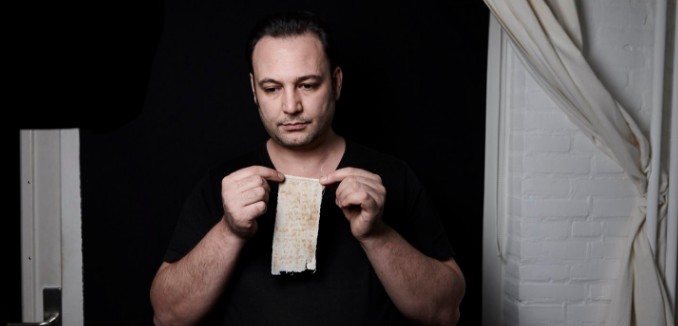Mansour Omari, a Syrian journalist and free speech activist, is launching an exhibition in collaboration with the United States Holocaust Memorial Museum in Washington D.C., detailing forced disappearance and torture under the Assad regime.
Omari was arrested in his Damascus office in February 2012 for his human rights campaigning and spent a year in a series of prisons, including a notorious facility under the supervision of Bashar al-Assad’s brother Maher, where he began to document the systemic abuse that he witnessed.
Omari and four of his fellow inmates recorded the names of 82 prisoners, details that were sewn, sometimes with their own blood, into the collar and cuff of a shirt and smuggled outside, in the hope to contact and inform the men’s families.
“We did it almost secretly. We didn’t want other people to know because there is a danger that some of them would tell the general,” Omari told The New York Times, explaining how he forged close friendships with the men in the confined quarters. “We were going to some groups, sitting with them, asking for their names,” he added.
The scraps of material are now being displayed at the Holocaust Museum as a poignant reminder of the killing machine that has claimed the lives of hundreds of thousands of people in Syria, operated by the Assad regime with the support of Russia, Iran and the Lebanese terror organization Hezbollah.
Omari, who now lives in Sweden, estimates that over 100,000 of people have been held by regime forces and material that has since been smuggled out of war-torn Syria shows widespread torture, ethnic cleansing and other war crimes at the hands of Assad and his supporters.
Omari also explained that most Syrians would have liked foreign powers to intervene to bring an end to the bloodshed. He said Syrians felt led down by the Obama administration, which took a hands-off approach in Syria not to endanger the nuclear deal with Iran.
“They hate so much Obama because he drew a red line, and didn’t interfere,” Omari said, adding that “They hate Obama so much, really.” While President Trump’s decision to launch strikes against Assad forces in response to a chemical weapon attack in April drew some criticism in the West, but Omari said that among the Syrian public, “almost everybody was happy.”
In August last year, the Holocaust Museum released a statement calling on the international community to intervene in Syria ahead of the regime’s assault on Aleppo. “President Bashar al-Assad and his government are committing crimes against humanity and war crimes against civilians, including acts of mass killing, torture and targeted attacks on medical facilities and health care providers”, the Museum concluded.
A Syrian police photographer known by the code name Caesar smuggled out tens of thousands of photographs documenting the terrible tortures and deaths to which Syrian prisoners were subjected.
Steven Rapp, then the top war crimes official for the U.S. government, declared in July 2014 that the Caesar’s photographs provided “solid evidence of the kind of machinery of cruel death that we haven’t seen frankly since the Nazis.”
[Photo: Twitter]




